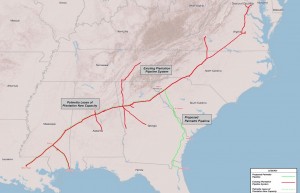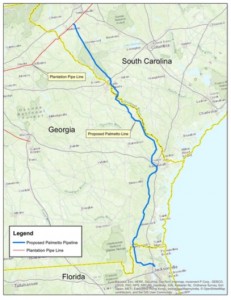A legal opinion issued by the office of South Carolina’s attorney general presents a new obstacle for a proposed pipeline for petroleum and ethanol to be built along the Savannah River and down the Georgia coast, to Jacksonville, Fla.

Savannah-area residents joined a protest rally against the Palmetto Pipeline in April. Credit: richmondhillsreflectionslive.com
The opinion contends that Kinder Morgan, Inc. does not have the power to condemn land for the purpose of installing the Palmetto Pipeline. If the pipe were to carry natural gas, the company could condemn property. But a petroleum pipeline doesn’t have the same legal standing as a gas pipeline, according to the opinion.
Through the opinion, South Carolina joins Georgia in rejecting Kinder Morgan’s ability to condemn land, if necessary, to build the 360-mile pipeline. The company contends that condemnation typically is used to acquire about 1 percent of necessary land acquisitions.
Kinder Morgan has appealed the Georgia ruling, by state Transportation Commissioner Russell McMurray. The company is expected to defend its ability to condemn land in South Carolina, if challenged in court.
The South Carolina opinion relies on laws that go back to the state’s efforts to develop a textiles industry after World War II.
In 1950, South Carolina’s legislature enacted a law that extended the state’s power of eminent domain to gas companies. Electrical companies already had condemnation powers, and the law extended the law to include natural gas in order to provide fuel for textile plants, according to the ruling.
The opinion concludes:

The proposed Palmetto Project would provide a pipeline from a fuel trunk line in South Carolina through North Augusta, S.C., Savannah, Brunswick, and Jacksonville, Fla. File/Credit: Kinder Morgan
The opinion was released July 1 and signed by South Carolina’s solicitor general, Robert Cook. Cook was named the state’s first solicitor general in 2013. The position is charged with developing legal policies and navigating constitutional questions, according to a statement released by South Carolina Attorney General Alan Wilson. Cook joined the state AG’s office in 1977.
The ruling responded to a request filed by the Aiken County legislative delegation. The five members represent the area of North Augusta, which is where the proposed pipeline would cross the state line from South Caroline into Georgia.
Kinder Morgan has not issued a statement regarding the South Caroline ruling.
In a statement released after the GDOT ruling, Kinder Morgan Products Pipelines President Ron McClain said:

This map provides greater detail of the proposed route of the Palmetto Project, a fuel pipeline. File/Credit: Kinder Morgan
The proposed $1 billion Palmetto Project would begin near Belton, S.C., where it would link to an existing pipeline that stretches from Baton Rouge, La. to near Washington, D.C.
From Belton, the proposed pipeline would be built along the Savannah River corridor to Savannah. From there it would pass through the watersheds of five rivers as it reaches the Brunswick area, continuing to a stopping point near Jacksonville.
The fuel it transports, up to 167,000 barrels a day, would serve consumers who now have limited access to fuel, according to pipeline developer Kinder Morgan. The Palmetto Project would provide Savannah and Jacksonville with their first major pipeline source, supplementing fuel brought in by ship. North Augusta would benefit from additional pipeline capacity.